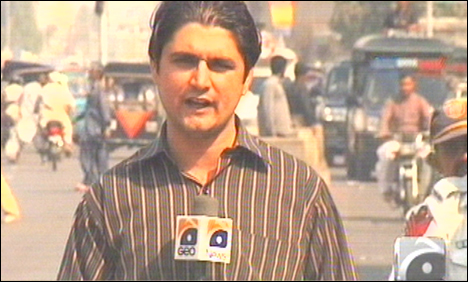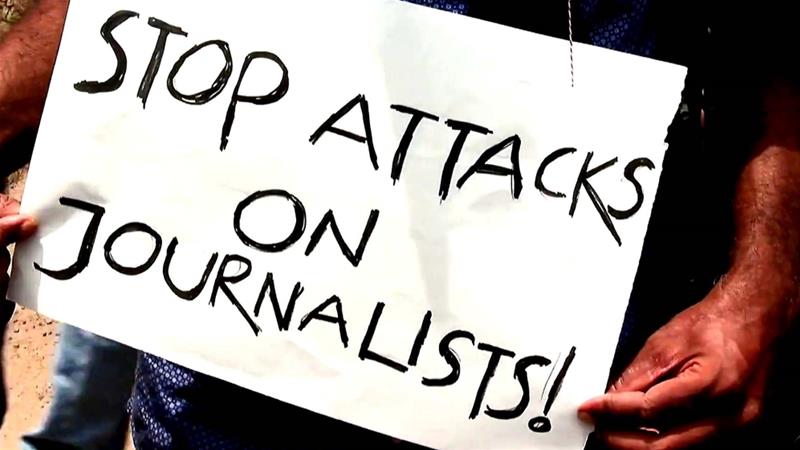The murder case of a young Pakistani journalist, Wali Khan Babar, has all the elements of an edge of the seat suspense drama, albeit one that ends in tragedy. Wali Babar was shot dead in January, 2011 followed by murders of at least five people allegedly linked to his court case that is likely to conclude on Oct 10th.
Supreme Court of Pakistan and Chief Justice of Pakistan, Mr Justice Iftikhar Mohammad Chaudhry must be given credit for ensuring a speedy trial. However, the case also exposed the weakness of the judicial and police system in the face of organized crime by not being able to protect witnesses.
If not a suspense drama, the whole case is certainly brings to mind a murder mystery. It is unprecedented in the manner in which one person after another linked with this case was assassinated leading to the conclusion that the story may not end with the verdict: it may just take another twist.
In the murders that followed Wali Babar’s, one person was found in a “bori” – gummy bag – the other was killed in his own house, another was chased after he shifted from one house to another but finally become a target to assailants after he shifted to a fourth house.
It is also a case in which the main accused was killed in a “police encounter,” involving the chief investigator of the case.
But the killing of Babar and people linked with investigation led to the major legislation in the Sindh Assembly where last week a “Witness Protection Bill,” was passed. A ray of hope in cases that fail to get anywhere due to threats to witnesses, though much still need to be done.
Journalist murder cases hardly see any trial and are normally closed as “blind cases.” At least this is what the record of around 100 cases showed. The only case in which the accused were arrested, tried and convicted within five months was that of US reporter Daniel Pearl of the Wall Street Journal. One of the reasons for this could be enormous pressure from the US government and the organization he worked for. Interestingly, an appeal against the court verdict in the same case has been pending for the last 11 years.
The only case of Pakistani journalist which went to trial court and the accused were arrested was of photojournalist Munir Sangi, who worked with the Sindhi language news channel KTN. Sangi was killed in Larkana while covering gun battle between two Unar tribes. Those arrested in this case includes former Sindh Minister Altaf Unar. The minister and others were later released on bail while Sangi’s widow and family faced and still face hardship.
In Babar’s case five accused are in jail while one of the main accused Liaquat was killed in an alleged police encounter in May 2012.
But Babar’s case is something more than merely a murder of a journalist. It remind one of murders of journalist in Colombia or Mexico where the underworld has a part to play.
Last week in the Supreme Court when Chief Justice of Pakistan Iftikhar Mohammad Chaudhry enquired about Babar’s case, the public prosecutor’s reply stunned the five-member bench and raised questions about the fate of this important case.
Prosecutor Shadat Awan informed the Court that only one witness was assassinated and denied media reports that five or six witnesses were killed.
“Sir, only witness was killed while the only witness alive has been provided complete protection,” Awan said.
“Are you sure?” CJP Iftikhar Mohammad Chaudhry asked.
“Yes, others killed were not witnesses in this case but related to the investigation official involved in this case,” Awan insisted.
However, when the bench sought the record and recalled the briefing given to them in the presence of the Mr Awan, who has a good track record as a lawyer, he assured the Court that he would look into the matter. The case is likely to conclude on October 10th, the date fixed by the lower court for final argument.
I was present in the Supreme Court in Karachi when it was hearing the “Karachi law and order implementation case”. The bench is hearing this case for the last two years during which Wali Babar’s case was cited quite a few time.
The court not only directed the authorities to provide complete protection to the only living witness of the case but also enquired about the proceedings.
Babar joined GEO, Pakistan’s leading Urdu language news network, a few years back. During the initial years of his career, he tried to expose the land mafia and was killed in what appears to be a planned murder.
Much has been written about the case and the media support community around the world is well aware of the high profile murder of a young Journalist. There were also a lot of speculations about the motive behind the murder – (1) Killed in the line of duty, (2) a personal matter, and (3) his political background.
Police as well as GEO believes he was killed for his work. His case became high profile as several of the witnesses were killed, something rare in a murder case of a journalist in Pakistan.
The question about the killing of witnesses came when reference was made about the recently passed “Witness Protection Bill,” by the Sindh Assembly. The legislation is certainly worth praising but one doubt it would be able to protect the witness in Wali Babar’s case.
One of the witnesses killed in this case become a target after he shifted to a fourth house, leaving one after another due to threats.
The story may not end after the verdict. It may have a new beginning. Babar was killed when he left his office for home near the Liaqatabad Police Station. He went after filing the story to be aired that night.
The story was aired, but it wasn’t the one he filed, but the one about his murder.
—————————————————————————————————————-
The author is former secretary-general of Pakistan Federal Union of Journalists.
—————————————————————————————————————-
Image: Late Wali Khan Babar
Courtesy: The News International

